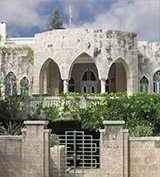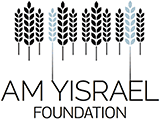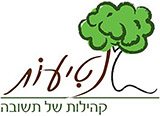
ITIM: Jewish Advocacy Center, Conversion to Judaism in Israel, Jerusalem, Israel
Targum Shlishi is supporting efforts by ITIM to make conversion to Judaism in Israel an easier and more inclusive process. During 2015, ITIM made significant progress in this area. After years of campaigning for legislation to open the doors of conversion, in August 2015, ITIM, along with other organizations and several prominent Orthodox rabbis, began offering an alternative to the restrictive conversion process provided by rabbinical courts. A network of private conversion courts, Giyur Ke’Halakha, was established; Targum Shlishi’s support provided seed funding for the project. In the first few months of the project, there was a great deal of activity as well as media attention—by January 2016, eighteen respected Orthodox rabbis had or will be participating in conversion court panels and have adjudicated 120 conversions, with a focus on people who were not successful with the state-sponsored conversion process. ITIM hopes that in the project’s first twelve months, five hundred conversions will be completed and twenty-five rabbis empaneled. The magnitude of the current problem stems from the large number of Israeli citizens from the FSU who are not recognized as Jews by Israel’s Chief Rabbinate. There are 350,000 immigrants from the FSU who were welcomed as citizens under Israel’s Law of Return. However, because they are not recognized as Jews, they are not eligible to marry, divorce, have Jewish children, or be buried in Israel unless they undergo conversion in official rabbinical courts. However, the conversion process is quite difficult. Not only is there a dearth of conversion courts—there are only three in the country—but only twenty percent of those who apply for conversion are successful.

Israel-Arab Studies Program at the Jerusalem Center for Public Affairs (JCPA), Research on Attitudes Towards Israel, Jerusalem, Israel
The Israel-Arab Studies Program at the Jerusalem Center for Public Affairs (JCPA) is engaged in a psychological research project to develop methodology to help understand the attitudes of young Americans who are ambivalent about Israel. Further, the study is investigating ways to foster attitudes that are more reflective of the country. The research will generate objective data that can guide leaders in shaping Israeli public diplomacy. This broad area of research has been ongoing by JCPA for several years under the supervision of Irwin J. (Yitzchak) Mansdorf, Ph.D., a psychologist and former clinical assistant professor at Columbia University and the State University of New York, and is conducted primarily by undergraduate student alumni of JCPA. “This project aims to address the lack of research-based methodology in understanding and analyzing inaccurate information related to Israel on college campuses and the general population,” says Dr. Mansdorf. In 2015 students completed a pilot study on several U.S. campuses to determine how well-known the BDS (boycott, divestment, sanctions) movement is and to look at factors that could influence student’s support of or opposition to the BDS. More than one hundred students were interviewed from four universities: Columbia, New York University, Florida Atlantic University, and San Francisco State University. The findings showed that while few students knew about the BDS, their opinions of support had to do with the idea of human rights. Students were opposed to the BDS if they felt it led to a lessening of dialogue, created suffering for Palestinians and Israelis, or weakened pro-peace, liberal groups within Israel. The next stage of research will focus on creating approaches based on liberal ideology rather than attempting to change minds based on traditional “talking point” arguments. The Jerusalem Center for Public Affairs (JCPA) is a leading independent research institute specializing in public diplomacy and foreign policy.

Toldot Yisrael, Documenting Israel’s 1948 Generation, Jerusalem, Israel
Toldot Yisrael is an organization that records and shares the testimonies of the men and women who helped found the State of Israel. The unedited oral histories produced by Toldot Yisrael form an extensive archive that is used by scholars, educators, and documentary filmmakers. While Toldot Yisrael is well-connected with museums and archives throughout the country, a recent agreement to house the interviews in Israel’s National Library will make them even more widely accessible. Toldot Yisrael’s oral histories range from two hours to twenty-six hours long, often recorded during multiple interview sessions. The first part of the interview typically covers events pre-1948, including personal memories, the individual’s childhood and home life, aliyah to Israel, and more. The bulk of the interview focuses on the period up to and including the War of Independence. The final portion focuses on post-1948 experiences. Toldot Yisrael notes the urgency of the project. In 2007, when the organization was founded, there was a pool of 120,000 interview candidates; more that 75 percent have passed away since then, and it is estimated that one in seven interview candidates will not live through the coming year. The goal of the organization has been to record 1,000 interviews. “In large part our objective derives from the paucity of firsthand accounts of Israel’s 1948 generation,” notes Aryeh Halivni, founder and executive director of Toldot Yisrael. “Although the Jewish community has done a wonderful job of documenting testimonies of Holocaust survivors, until recently there was no effort made to record the stories of those who witnessed and were part of Israel’s founding.” Targum Shlishi’s support is covering eight interviews.

Am Yisrael Foundation, Tel Aviv Center for Jewish Life (CJL), Tel Aviv, Israel
This start-up initiative seeks to build and nurture English-language Jewish community life in Tel Aviv. While this community is growing in numbers, it is lacking in Jewish communal leadership, despite being located in Tel Aviv, the key city in connecting global Jews to Israel, and the city where most international young professionals and students spend their time while in Israel. Vibrant community life for the English-language community is lacking, but there is a need and a longing for it: for connection, education, and spiritual growth. The CJL’s mission is to cultivate the existing community of English speakers into a more cohesive community centered around Jewish life by establishing a center for Jewish life in the heart of Tel Aviv and bringing a dynamic Jewish educator to serve as rabbi.

Nettiot, Aderaba magazine, Israel
Aderaba, a magazine published in Israel, has in a few short years had a major impact. Since its founding in 2008, Aderaba has significantly contributed to the community of Israeli ba’aley teshuvah (returnees, or people who become observant later in life). The monthly magazine tackles core issues in the ba’aley teshuvah community, with the objective of motivating returnees to embrace a significant role in Israeli society and within the haredi world. Targum Shlishi is helping to support the monthly magazine. Subjects addressed in Aderaba‘s articles range widely. Examples of past article topics include the role of the rabbi within the community, social involvement, and the emerging role of women as spiritual leaders. Aderaba is one of several initiatives and social projects under the umbrella of the Israeli organization Nettiot (Plantings), a network of communities of ba’aley teshuvah. In fact, Aderaba has played a significant role in the establishment of the Nettiot network and its success. “Aderaba has actually reshaped the discourse in the ba’aley teshuvah world and beyond. It has given the most sensitive and complicated issues a room to be debated. Furthermore, it has led to significant action,” says Aharon Ariel Lavi, strategic planning director of Nettiot.

